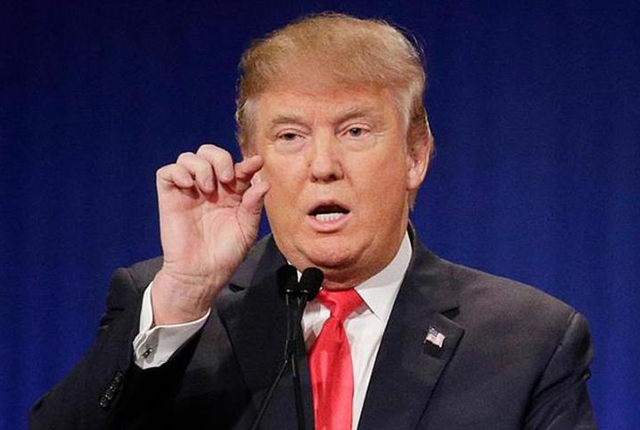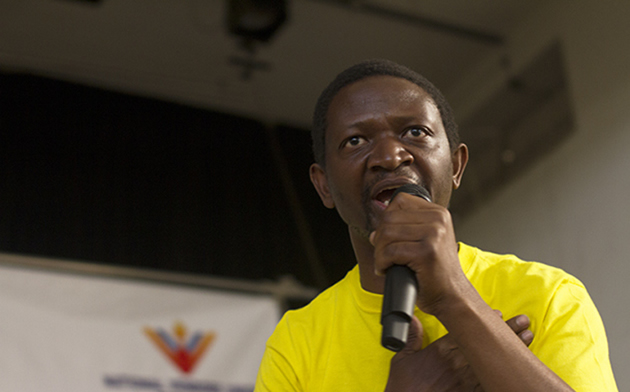THE OTHER SIDE NATHANIEL MANHERU: Bond notes: When mere depositors debate

THE OTHER SIDE NATHANIEL MANHERU—
An interview Donald Trump is alleged to have had with People Magazine in 1998 quoted him as saying: “If I were to run [for US presidency], I’d run as a Republican. They’re the dumbest group of voters in the country. They believe anything on Fox News. I could lie and they’d still eat it up. I bet my numbers would be terrific.” Described as the most resilient meme, the imaged quote is thought to have been inserted in 2015 soon after Trump announced his decision to run for presidency. The hope of course was to de-campaign him and, fearing such an outcome, his side strenuously distanced him from the quote.
Today Trump is set to go to White House, thanks to the voter who normally votes Republican, a voter largely white, gun-loving and conservative. I refrained from housing that voter within the Republican church, given that Trump won elections in spite of a glaring lack of institutional Republican backing. Not even their goodwill, let alone the backing of the Establishment, which is why he is set to govern within a loose straitjacket, relatively speaking.
Campaign messages don’t govern
But was the view in the quote ascribed to him true of the Republican voter? Of course it was, however untrue the source of the quote may have been. Not so much inso- far as the Republican voter swallowed Trump’s nebulous and extravagant messages hook, line and sinker. But insofar as they ever imagined that his campaign message(s) would govern America. That was remarkably dumb, was it not? So far Trump has appointed two women, significantly one of them of Indian descent. Names for Secretary of State include Mitt Romney and Rudy Giuliani, figures ranking foremost among his trenchant critics only a short while ago. His Housing Secretary is likely to be not just an African-African American, but a medical doctor who contested him for Republican party primaries. Who knows, another highly symbolic appointment may be in the offing, to the greater horror of the Republican voter. Today these voters now know, or should know, that messages which win White House are not the same message which keep it. Or more critically, that a winning candidates does not make appointments that vindicate his campaign politics; rather, he makes appointments that assures him of a second term. In that respect, Trump is not dumb. I can see what he is doing, see where he is going and, what is more, how far he means to go there.
The cut which went deep
I had a chuckle only the other day when the New York Times secured a meeting that morphed into a wide-ranging interview with the man it had demonised only a few electoral weeks back. Interestingly, it was not just the publisher who attended that maiden meeting with the President-elect; virtually all its leading columnists – most of them leading scholars – did too.
And the discussion must have been wide-ranging, judging by the copy that followed, much of it though remarkably restrained still carrying strains of derision. And if you are not clear on how America does her politics, you would conclude from those subsequent articles that the mating failed.
It didn’t, unless you are a Republican voter! All this is what is called changing editorial course, but without losing face, without losing credibility, without losing readership. For to the discerning, the tone was very much calculated, well calibrated or graduated, ably providing subtle hints at greater fornication in future, even love ahead.
All the President’s men
On climate change, Trump was described as “making a virtue of not knowing the issues”, a clear and New York Times-assisted way of preparing the reader to an about-turn from his campaign-time fundamentalist position on the matter.
Equally, Trump’s about-turn on his campaign message on water-boarding – a euphemism for American torture – was hung on “expert” advice opportunely given by a retired general, now his National Security Adviser, who in colour says give me a tot, a cigar and something else, and I will do a damn good job that torture can’t deliver!
Thanks to the hitherto Clintonite New York Times, Trump comes across as infinitely flexible, as open to persuasion, the very opposite of a brittle, hidebound Republican candidate the same paper projected him to be. We are seeing the evolution of a governing philosophy, a governing partnership of necessity, indeed the making and selling of a president.
Above all, we are seeing the making of “all the president’s men”! Political-Media complex it is called, whatever liberal theory you may have on the media. Good stuff for political scientists.
So low on Maslow’s hierarchy
The other time I rhetorically asked for 2 million jobs from our unemployed graduates. I received a searing flack, was roundly reviled and called all sorts of names. But barring the insults, I received a bumper response, which suggested I had disturbed a living tissue, rubbed tender meats closest to the bone. It gave me immense pleasure, enough to assuage my frustrations, even though I remained a little downcast for a while longer.
The responses I got lacked depth, indeed confirmed us as creatures of drudgery, a nation of men and women who argue like we are all job-seekers, not nation-builders. And a people so low on Maslow’s lofty scaffolding, hardly ever give you decent debate. It is as if we can’t even be philosophical about our temporary predicament; as if we are trapped, too trapped in lower order needs to engage at the level of ideas.
Spare me all this nonsense about being overwhelmed by current challenges, that lamest alibi. I have seen greater suffering elsewhere, seen even greater intellect obtruding, cutting through that suffering to glow. Greatest world philosophers have always emerged from stupendous crises, from key turning points in the life of nations. So have the greatest writers; greatest, most enduring thinkers.
Are we any different? That we become fatalistic, get atrophied? That we can’t even describe the state we are in, define our current woes? Illustratively when Nigeria was going through challenges, it gave the world its best intellect, adorned its troubles with amazing rhetorical flourish. Going back to older societies, Daniel Defoe – the father of the English novel – became a foremost writer in response to the hugely upsetting industrial revolution. Karl Marx, Charles Dickens developed their ideas at the height of heartless Victorian capitalist urbanisation. We have no excuse for not engaging at the level of ideas. None at all.
Distorting the National Question
The current debate on currencies in use in our country, particularly the introduction of the Bond Notes, has grabbed surprising attention, gained surprising intensity. One would think it has now morphed into a real National Question. Yet it is not, can never be. Maybe an oblique facet, or a contorted face suggesting the National Question. But never the National Question itself.
The National Question remains one of completing the unshackling this country from colonial imperialism. The issue of currency is a tiny aspect of it, indeed proof of our susceptibility to recidivism, well away from the goals of national liberation. Arguably there is a way in which the space and emotion invested on this very issue of currency suggests poor national focus, indeed an unpardonable distraction if not a falsification, of the real National Question.
Is it not funny that we have citizens who are ready to lay down their lives in defence of the use of the United States dollar? Or the converse, all to block the return of a national currency? Yet this is where we are, and there is no running away from the fact that the issue has assumed encompassing proportions of a be-all matter. And that it has morphed from being an esoteric monetary issue to being a full-blown hot political issue is quite telling.
A dying nationalism?
We can’t avoid asking why this has been so, why this is so? Why so much debate when there is not even the suggestion that the proposed Bond Notes will supplant or displace currencies of other countries already in the national basket, much as one still cannot understand why this is not so?
Asking why so much debate when the Bond Notes themselves have already been prefigured by Bond Coins which are already in circulation, and have been widely accepted as a living tissue of our transactional fabric? Why so much debate when Bond Notes have been accorded a one-to-one value with the US dollar, itself the de facto anchoring currency, in fact have been insured by a Fund denominated in the same currency?
The Bond Note has been called a surrogate currency, a shadow of the mighty US dollar. And we say so unabashedly, we the avowed revolutionaries who will not hesitate to be surrogates, mere shadows of America! Why so much debate when the multi-currency epoch has been with us for a mere seven years, after well over 29 years of using a national currency?
Why has a transactional habit of under a decade taken greater hold on us than a life of nearly three decades? Why this debate for the US dollar when the Bond Notes is supposed to sit well, indeed validate our temperament as an anti-colonial, anti-imperial people? Is this a dying nationalism? Fanon must be weeping in his grave. Surely, currencies are more than mere instruments of exchange; they are national symbols. So why repudiate a key, defining national symbol?
Craving for the dollar illusion
Still more questions. We all know how economies build stocks of currencies of other nations, including the United States dollar, itself one of the international currencies. By and large, this is through trade, through the export performance of home economies. Additionally but not singularly, through external support, itself a baneful way to build, rebuild or maintain stocks.
As an economy, we have not been doing too well on the export front. We are just beginning to take measures likely to repair and restore our export capabilities, our export capacity. Very few companies are doing business abroad, in the sense of exporting goods and services.
But the debate has not been on our weak performance. Rather, it has been on how we must equip ourselves with an earnings illusion through national use of a currency we can’t earn, we are always short of. Are we being rational to demand the use of a currency we have not been earning? Or is this the real reason behind our agitation for some rapprochement with the West? So that dollar illusion is kept up; that shadow status, that surrogate status? Rapprochement so we get through goodwill what we cannot earn on the hard market through sheer hard work, ingenuity and competitiveness?
Loving those who hate us
Except for the Chinese yuan and the South African rand, the rest of the currencies in our basket belong to countries and regions that have been less than friendly to us, both by way of enabling us access to their markets, and by way of the tenor of their politics. These nations have erected barriers, including political barriers. Others have even slapped us with sanctions.
Why this craze for their currencies which we haven’t been earning that well, certainly which we cannot be granted access to through donor bilateral or multilateral support? And if one were to take SI 63 which is now an irrevocable reality, it is not like we will fill our shelves through imports, let alone imports from the United States of America? So?
And we get so engrossed in currency debate to the point of forgetting we hold fabulous natural resources we must exploit. And we get so engrossed in the currency debate, get infatuated with the United States dollar which make our products uncompetitive sub-regionally? Now there is talk of internal devaluation of the US dollar, economists’ clever way of reducing the cost of sales, starting with labour. In other words, the use of the US dollar is inherently anti-labour. Yet our unions are for it?
Debating a mere vendor?
Descending to a micro-level, the charge for the retention of the US dollar has not been led by people one would say are in the export business, people who run foreign currency accounts. Not even people in the Diaspora whose earnings pass for foreign currency here.
Zvorwadza – a mere vendor – has been the face of this US dollar brigade. His sense is to fritter away the few dollars earned by others, spend them on flea-infested second-hand garment bales. Mabhero? Does it make sense for local employees of non-exporting propositions to demand payment in a currency other than a national one? Or for net drawers of currency savings for spending on profligate consumption to hold sway, to drag us into a false debate?
Who earns that foreign currency which they want to spent, or in which they expect their emoluments to be denominated monthly? Above all, there is no suggestion that the Bond Note will not procure locally; that we are likely to have better-stocked enclave supermarkets whose goods are exclusively obtainable through the use of foreign currency. So why this currency hullabaloo?
Not Homo economicus?
Trimming the argument to currency preferences, is the rejection of the Bond Notes an acceptance of any or all other currencies in the basket? Or is the rejection of the Bond Notes a tongue-in-cheek preference for a specific currency – the United States dollar?
Why is that so? How has our so-called multi-currency situation become a single currency situation in which the US dollar is the only usable one? Surely, the United States of America is not Zimbabwe’s greatest, even best trading partner? Surely the United States of America is not the most friendly country to Zimbabwe? And because of these two factors plus much more, surely the United States dollar is not the easiest to get? As things stand, South Africa and China rank higher, better, as our trading and retooling partners than the US. Even as preferred destinations for our cross-border vendors! Why is this not showing in the whole currency debate? In currency preferences of users? At some point we even rejected the rand, almost rendered it virtually unusable in Zimbabwe. To this day it is not the most preferred currency, in spite of what South Africa means to our economy. Why? Or do all these questions suggest we are irrational, we are the very opposite of Homo economicus?
One little book that gives clue
Dear reader, I have battered you with so many questions, hopefully to get you to look at the whole debate in any different way. I do not want to provide answers to the questions I have raised, most of them leading. That is not the purpose of this column. Mine is to shake assumptions, to rouse you from the slumber of things and points you are likely to take for granted. There is nothing random, rational about this whole debate when measured against economic realities of Zimbabwe. Or even her socio-economic interests. Which is what makes the whole matter vexatious.
We seem so determined to act against ourselves, indeed to act for some foreign interest. But before I bow out, I want to make one or two points related to the whole matter. There is some little book I have been reading lately. It is titled “Preachers, Peasants and Politics in Southeast Africa, 1835-1880”, written by one Norman Etherington. Published in 1978 by the Royal Historical Society of London, this little book looks at the rise of African Christian communities in Natal, Pondoland and Zululand, between the above-quoted years.
It has a chapter titled “Economic and Educational Progress of the Kholwa”, and “Kholwa” was a derogatory name given to African Christian converts in those days. In looking at the contrasting views towards cattle – themselves the mainstay of native economies before and during the early part of colonisation – contrasting the views of what the writer terms “heathen” Zulus, and those of Zulu Christian converts or Kholwas, Etherington wrote: “There were, to be sure, heathen Africans whose riches on paper far exceeded the possessions of the affluent black Christians . . . Undoubtedly, several chiefs in Natal could lay claim to even larger holdings [of land]. And over the border the Zulu monarch maintained enormous herds: But these concentrations of wealth differed in kind from the property of African Christians. In the traditional economy, cattle were not a means by which a man became wealthy; they were his wealth.”
So much wealth without being wealthy
Gentle reader, the last sentence in the preceding quote is key: difference between cattle as wealth and cattle as assets by which one became wealthy. It is much more than a difference between a noun and an adjective. Rather, this distinction is at the heart of that dismal science called Economics. Much more, that distinction differentiates static societies from dynamic civilizations. Etherington suggested that the so-called heathen Zulu societies were still to recognise the exchange value of assets they held, principally cattle, in the process being therefore able to transform cattle from mere innate mooing symbols that marked status, which fulfilled rituals, which satisfied expectations of inheritance, to being tradeable assets by which new assets could be acquired, broader portfolios built.
By contrast, Zulu Christian converts who had been exposed to Western capitalism which accompanied the gospel, had already mastered the art of reading the exchange value of cattle on the market, all to use them to accumulate a broad range of assets as well as build portfolios sure to change their fortunes. And in those days fortunes really changed. If one remained trapped in traditional Zulu ethos, with its cattle-complex, one could not escape vagaries of harsh laws designed for natives, would never graduate towards being governed under European laws only open to whites or people of property.
More dramatically, unless and until you owned land, lived in a brick-and-mortar, rectangular house, you were still subjected to the notorious “hut tax”! And many traditional Zulus who commanded hordes and hordes of cattle, who lived in kraals, not locations of suburbs, still paid hut taxes. The irony is they had the cattle which could have made them wealthy enough to escape that derisively taxable bracket. The trouble is their wealth never could make them wealthy. It lacked exchange value!
Shoppers, wage-earners
I find it curious that the issue of currency, itself not the issue of the real economy, is exercising us so much. The debate on currency has proved more emotive, more riveting, than the debate on land, itself part of the real economy. Why? The debate on currency is proving more engrossing, even economically more significant than allocation of inputs under Command Agriculture through which tradeable commodities are created, indeed through which value is made. Again, why?
The debate on currency is proving more frenetic than a discussion on issues of real estate, issues of residential stands. Why? The Zvorwadzas are readier to take to streets over the use of the US dollar than over the way residential stands are being distributed. Or bricks are being priced. Or cement. We have had indigenisation and economic empowerment on the cards for quite a while. It was a core promise of Zanu-PF in the past election. With barely a year to go to the next harmonised elections, there is little to show on indigenisation and empowerment of the mines. Yet debate on that front is muted, non-existent even. It certainly is dwarfed by the debate on Bond Notes, the debate on the two million jobs that will not come. The one makes us petty shoppers, the other mere employees. We sum our destinies in those two magnitudes? Is that our vision for ourselves?
Dollar wise, mine foolish
Yet if real assets were to change hands: land, houses, cattle, mineral claims, etc, etc, the currency of transaction would most probably be the Bond Note. Why this fixation with currencies for vending – for cross-border trading – as opposed to a currency for wealth creation, for asset acquisition, for real transformative economic activity?
Surely, none of the US dollar warriors have enough US dollars to rent-to-buy a room even in Harlem? Some don’t even have a dollar on them. Yet they are ready to die for it to remain the currency of transaction! But through the Bond Note they can buy land, buy bricks, build a home, reshape their destiny as Zimbabweans. Whatever the sins we impute on Gideon Gono, the former Governor, there was greater asset formation during his tenure. With his bearer’s cheques, Zimbabweans with a good business sense used them to become wealthy.
To acquire and build assets; to work the land; to buy homes, residential stands, unlike those foolish Zimbabweans who treated bearers’ cheques as wealth, kept them in savings accounts. And this is key to understanding the current debate, key to understanding the current fascination with currencies: for all our vaunted knowledge, we remain a nation of shoppers and employees, of depositors, of bank account holders. We are still to become wealth-owners. A people who mistake money for wealth; never a wealth-creating nation. That to me is the tragedy, the clue to understanding this oversized debate on currencies.
This frenetic defence of currencies which are not even national, which we don’t have, which turn us into mere vendors, is what is the trouble with us. We are likely to fight a governor who threatens us with Bond Notes, while befriending an American who takes our platinum mine in exchange of a dollar. Dollar wise, mine foolish. That’s us.
Icho!












Comments